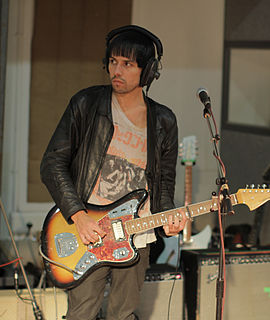A Quote by Joseph Sittler
On the first page of the Bible there is an instance of how literalism is but an invitation to transcend the image to which literalism points. That first page is not geology, biology or paleontology; it is high religion. For there we are told who we are in terms of our constititutive text. And if we could understand that, we would worrying about whether the antelopes or the cantaloupes came in a certain order.
Related Quotes
We know from astronomy that the universe had a beginning, from physics that the future is both open and unpredictable, from geology and paleontology that the whole of life has been a process of change and transformation. From biology we know that our tissues are not impenetrable reservoirs of vital magic, but a stunning matrix of complex wonders, ultimately explicable in terms of biochemistry and molecular biology. With such knowledge we can see, perhaps for the first time, why a Creator would have allowed our species to be fashioned by the process of evolution.
Text is linear; it is black and white; it doesn't zoom around the page in 3-D; it isn't intelligent by itself; in fact, in terms of immediate reaction it is quite boring. I can't imagine a single preliterate was ever wowed at the first sight of text, and yet text has been the basis of arguably the most fundamental intellectual transformation of the human species. It and its subforms, such as algebra, have made science education for all a plausible goal.
If we don't understand how metaphor works we will misunderstand most of what we read in the Bible. No matter how carefully we parse our Hebrew and Greek sentences, no matter how precisely we use our dictionaries and trace our etymologies, no matter how exactly we define the words on the page, if we do not appreciate the way a metaphor works we will never comprehend the meaning of the text.
What I mean by context is worldview - having the ancient Israelite or first-century Jew in your head as you read. How would an ancient Israelite or first-century Jew read the Bible - what would they be thinking in terms of its meaning? The truth is that if we put one of those people into a small group Bible study and asked them what they thought about a given passage meant, their answer would be quite a bit different in many cases than anything the average Christian would think. They belonged to the world that produced the Bible, which is the context the Bible needs to be understood by.
It would just be a pamphlet. Three pages. The first page would be Drugs I Have Taken and then a list. The next page would be People I Have Slept With and then another list. Then the last page would be Famous People I Have Partied With and then another list. Because that's all people write in their autobiographies. Cut out all the bullshit and it's just a three-page pamphlet.
It was probably 10 at night when I started to read Donnie Darko. I get in bed and read the first page, and I go, "Hmmm. That's interesting." Second page, "Wow." By the fourth page, my heart started to beat, and I knew. It makes me cry, because I knew I had found a classic film. You just know when you get certain material.

































